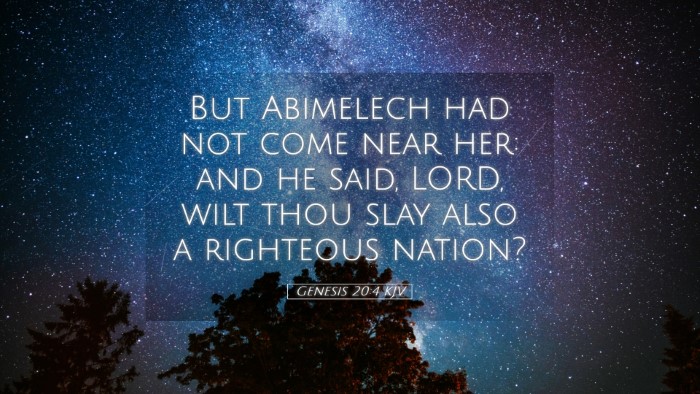Commentary on Genesis 20:4
Verse: "But Abimelech had not come near her. And he said, 'Lord, will You slay a righteous nation also?'
Introduction
This verse is situated within the larger narrative of Abraham's journey and the interactions he has with kings and nations. The text emphasizes themes of righteousness, divine sovereignty, and the moral implications of human action. Abimelech, the king of Gerar, addresses God regarding his encounter with Sarah, indicating his concern over his moral integrity and fear of unjust punishment. This commentary synthesizes insights from renowned public domain biblical interpreters.
Contextual Background
Abimelech’s question to God arises after he has taken Sarah into his house, believing her to be Abraham’s sister rather than his wife. This misunderstanding is critical to the narrative, revealing both the seriousness of the situation and God's protective hand over Abraham and Sarah. Previous verses depict Abraham’s fear leading to a deception that places Sarah in jeopardy.
Matthew Henry's Insights
Righteousness of Nations: Matthew Henry emphasizes that Abimelech's appeal to God highlights a significant theme: the righteousness that must characterize nations. Abimelech, not being a covenant man, acknowledges a moral standing that God recognizes. Henry cites that God's dealings with nations are often tied to their moral behaviors.
Fear of Divine Retribution: According to Henry, Abimelech’s response portrays a fear of God's justice. He understands the gravity of taking another man's wife and invokes God's mercy, indicating his awareness that innocence can still be endangered by human actions. The plea for sparing a righteous nation is profound as it underscores societal accountability in the face of divine law.
Albert Barnes' Commentary
Nature of Righteousness: Albert Barnes notes that the term 'righteous' here refers to the righteous conduct that Abimelech believes his nation possesses. His plea suggests that righteousness, whether personal or communal, is a vital aspect of a nation's integrity. Barnes starkly contrasts divine judgment with human governance, indicating that God operates on a much larger scale than human rulers.
Abimelech's Integrity: Barnes stresses Abimelech's innocence, pointing out that his intentions were not malicious. He sought to do right by following cultural norms, but was nonetheless under a divine threat due to an act he did not fully comprehend. This introduces the tension between divine sovereignty and human action, raising questions about accountability and knowledge.
Adam Clarke's Analysis
Divine Intervention: Adam Clarke draws attention to God's providential care over Abraham and Sarah, asserting this narrative reflects God’s active governance of human affairs. Clarke states that Abimelech's question serves as a reminder of God's merciful nature, showcasing that even when humans err, divine grace prevails.
Discussion on Nationhood: Clarke further elaborates on the implication of being a 'righteous nation.' He presents a nuanced view of national ethics, suggesting that God's concern extends beyond individuals to the collective morality of societies. This calls believers to advocate for moral uprightness in their nations, fostering a culture that aligns with divine principles.
Theological Implications
Genesis 20:4 invites several crucial theological reflections:
- Divine Judgment: This episode illustrates God’s role as a divine judge, who is attentive to both individual and collective moral conduct. The fear of punishment signifies that divine laws transcend human understanding.
- Moral Awareness: Abimelech represents a moral figure who acknowledges God’s authority and seeks to understand his place within it, offering an example for believers who wrestle with ethical complexities.
- Protection of the Innocent: The verse reinforces the theme of God’s protection over the faithful, evidenced through the divine warning that intervenes before harm befalls Sarah or Abraham.
Conclusion
Genesis 20:4, through the lens of Abimelech's question, underscores significant biblical themes of righteousness, divine mercy, and the impact of sin. Both the characters within the narrative and the overarching divine commentary echo timeless truths about human nature, accountability, and the consistent call to a higher moral standard. These lessons remain pertinent to pastors, students, theologians, and scholars today, urging them to wrestle with the implications of their faith within a complex world.


